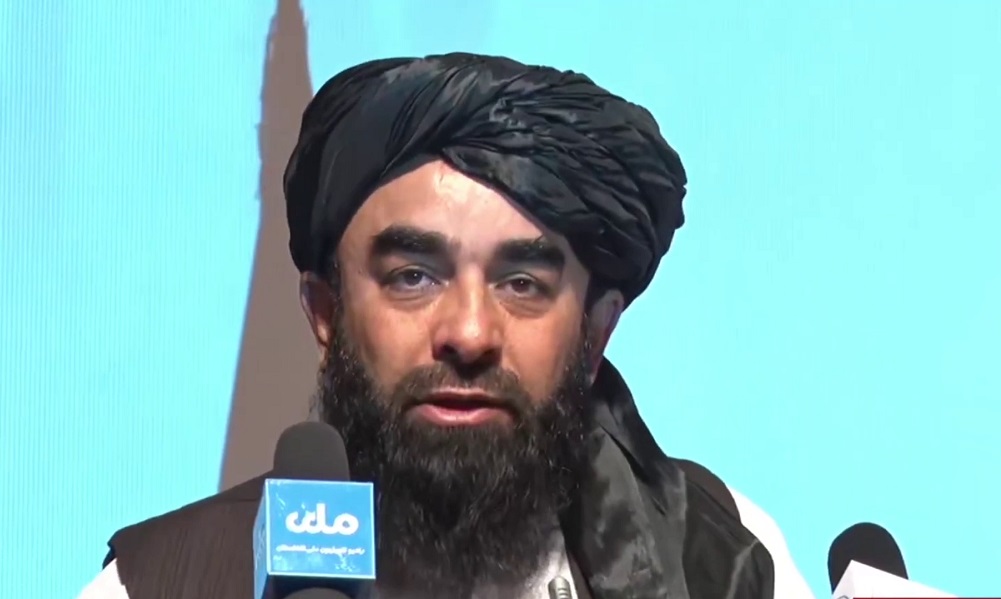Latest News
Mujahid: The Islamic Emirate believes in freedom of press

The spokesman of the Islamic Emirate said on Sunday that the government believes in freedom of the press and supports media outlets where content is in line with Sharia and national interests.
Zabihullah Mujahid said this while speaking at a seminar organized by the Ministry of Higher Education.
“If we observe the Islamic principles, national interests and prevent spreading of rumors and pure propaganda of intelligence activities, the government strongly supports the press and media, and if the media operates within this framework, it will not have any problems, rather it will be supported, and that media will be the real media of our country,” Mujahid said.
He also called on officials to listen to criticism reflected by the media.
“May government officials listen to criticism with patience. If it is not true, they should respond, and if it is true, they should bring reforms. This is the cooperation of society with the government. When this cooperation is brought together by the media, we can have an advanced and stable country.”
Mujahid also emphasized the importance of impartiality of the media and said that the media should be a neutral bridge between the government and the people so that trust in the media increases and the rulers can address the problems of the people.
“The responsibility of the media is that they should be neutral and not biased as they act as a medium between the government and the people. When they criticize the government or have an objection or question about the government, they should raise it as a third party. When the media acts as a third party, the government also trusts the media,” he said.
The spokesman of the Islamic Emirate also said that national unity and establishing relations with the world are part of Afghanistan’s national interests, and the media has an obligation to strengthen national unity in the country and not allow division.
He added that the media do not have absolute freedom anywhere in the world and are subject to laws, and Afghanistan, which has an Islamic system, has its own laws which apply to the media.
Latest News
Continued aid to Afghanistan vital for regional security: Kazakh president

Kazakhstan’s President Kassym-Jomart Tokayev has emphasized the continuation of humanitarian assistance to Afghanistan, stating that the ongoing provision of such aid plays an important role in ensuring regional security.
Speaking at the international conference “Peace and Trust” in Ashgabat, the capital of Turkmenistan, Tokayev described addressing complex humanitarian challenges and the reconstruction of Afghanistan as a necessity.
“To ensure regional security, we consider it essential to continue providing assistance to Afghanistan, including by strengthening international efforts to address complex humanitarian issues and the reconstruction of this country. Kazakhstan remains committed to supporting the people of Afghanistan through humanitarian aid, educational projects, trade development, and food security initiatives,” he said.
Meanwhile, experts believe that sustainable improvement of the humanitarian situation in Afghanistan requires broad cooperation from the international community and support for the country’s economic development.
“Investment can be defined as one of the fundamental drivers of the economic cycle, and whenever Afghan traders do not take their money out of the country and instead invest domestically, it naturally leads to greater growth and dynamism in Afghanistan’s economy,” said Abdul Zahoor Modabber, an economic analyst.
As the humanitarian crisis in Afghanistan continues, reports by international relief organizations indicate that millions of citizens of the country are in urgent need of food, health, and livelihood assistance.
The reduction in funding for aid organizations, the impacts of climate change, and the return of migrants have increased concerns about a further deterioration of the humanitarian situation in the country.
Latest News
Islamic Emirate declines to attend Tehran meeting on Afghanistan
Latest News
Sirajuddin Haqqani: A government that intimidates its people is not a true government

Khalifa Sirajuddin Haqqani, Minister of Interior of the Islamic Emirate of Afghanistan, said during a visit to Khost province on Friday that any government which rules through fear cannot be considered a true government.
“A government is one that is loved by its people, one that serves them with respect and compassion, and from whose behavior people learn ethics and sincerity,” he said.
Haqqani also stressed that Afghans who opposed the Islamic Emirate in the past should be tolerated and treated in a way that helps eliminate hostility and animosity, paving the way for national cohesion.
-

 Sport4 days ago
Sport4 days agoILT20: Desert Vipers edge Gulf Giants in historic super over thriller
-

 Latest News2 days ago
Latest News2 days agoMuttaqi: Afghanistan’s progress requires both religious and modern education
-

 Regional4 days ago
Regional4 days agoSix Pakistani soldiers killed in TTP attack in Kurram District
-

 Business4 days ago
Business4 days agoTrade bodies warn almost 11,000 Afghan transit containers stuck at Karachi port
-

 World4 days ago
World4 days agoPowerful 7.6 earthquake hits northern Japan, tsunami warnings issued
-

 Latest News3 days ago
Latest News3 days agoTrump calls Afghanistan a ‘hellhole’ country as US expands immigration restrictions
-

 Sport5 days ago
Sport5 days agoSorkh Poshan Khafi defeats Sarsabz Yashlar 4-0 in Afghanistan Champions League
-

 Sport3 days ago
Sport3 days agoCommanding wins for Arman FC and Sarsabz Yashlar in Afghanistan Champions League

























